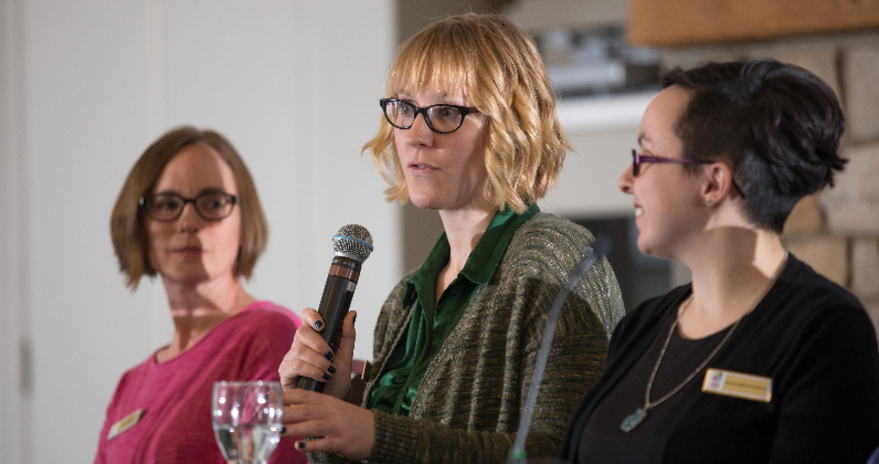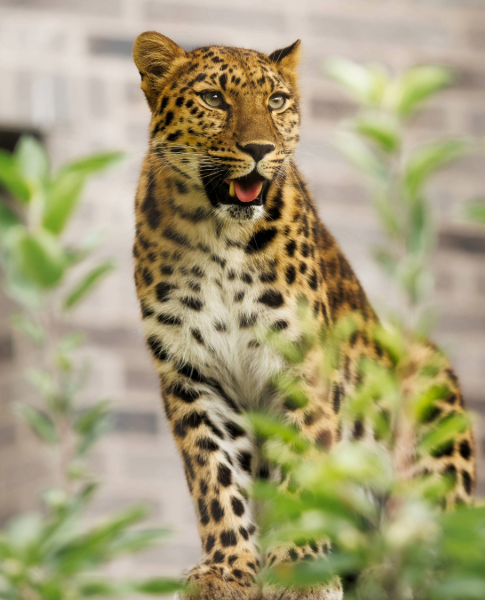Q + A with Dr. Diana Koester
Posted on Tuesday, March 10th, 2020
As the Zoo’s reproductive endocrinologist, Dr. Diana Koester is constantly using science to find answers to problems in animal reproduction. Keep reading to learn more about her role at the Zoo.

What inspired you to work in science?
My parents took me to zoos all the time when I was young, and we were constantly outside. They instilled in me a respect and curiosity for nature, but it wasn’t until I volunteered in a research lab in undergrad that I found out I really enjoyed and had a knack for developing research questions and figuring out ways to answer them.
What do you do at the Zoo?
My official title is Research Curator, but I am the Zoo’s reproductive endocrinologist, so I seek to answer questions about reproductive function in animals primarily by looking at their hormone concentrations and patterns. I look to hormones to find new and better ways to measure welfare in the animals in the Zoo’s care, as well as to answer questions from animal care staff members to improve animal health and welfare.
How do you use science daily in your work?
I’m a full-fledged staff scientist at the Zoo, so depending on how you define science, there’s a good chance I’m doing, thinking, or planning to do something science-related pretty much all day, every day!

What excites you about your work?
I get the chance to uncover information to answer questions that no one else has yet been able to answer, and then most of the time, that information can be used to make the lives of animals in zoos better! Ever since I was very young, it was meaningful to me to be able to improve the lives of other organisms, even in some small way. Now I get paid to do this, and when I get to see the results, it’s unbelievably rewarding for me.
What advice do you have for someone wanting to work in science?
I would have the same advice for anyone wanting to work in the science field. It is to be willing to work hard. Determination will get you much farther than being super smart will, I promise.

Dr. Koester speaking at a Conservation and Research Night in 2017.
What is something you want to study in the future?
My goal as a scientist is to become a proper comparative endocrinologist, which will take a lot more learning and experience than I have at this point in my career. I want to be able to understand key differences among many species of extremely varied taxa.
Right now, the basis of my knowledge is in mammalian carnivores, but I want to establish a fundamental pool of knowledge to pull from that includes reptiles, amphibians, birds, invertebrates, fish, as well as many different types of mammals. The more I learn about any species, the more fascinated I become by it. I want to know something about everything!
What is your favorite thing about working at the Zoo?
There are many things I dearly love about working for the Zoo. Up near the top is the fact that I get to work with tons of other people that are just as passionate and interested in animals as I am. It always makes me feel at home. Because my job allows me to work in many different areas of the Zoo, I get the chance to interact with lots of different keepers and see their enthusiasm for the animals they care for and share in it with them.
There is rarely a day that I am not in awe of some situation I somehow find myself in at the Zoo and I try to take time to appreciate the amazingness of that high pitched squeaking sound an adult rhino makes, or the way wrestling snow leopard cubs appear to have no bones, or how it takes your breath away when a giant pacific octopus focuses an eye directly on you.



